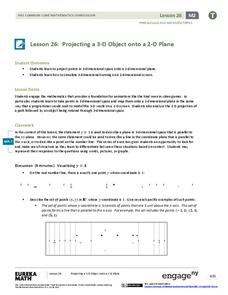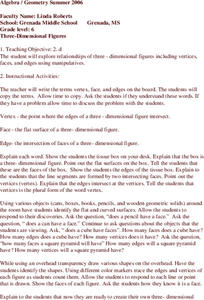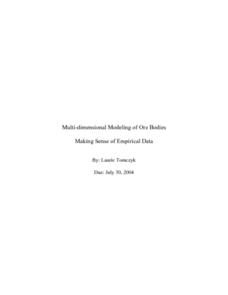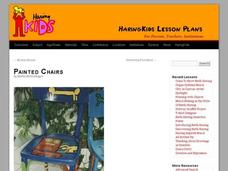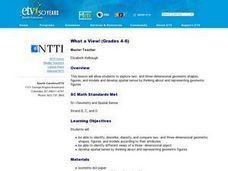Curated OER
We All Scream for Ice Scream
High schoolers explore the formulas for volume of three-dimensional objects. They participate in various activities involving ice cream, ice cream cones, small candies, and gum balls, recording their calculations on a lab sheet.
Curated OER
Applied Science - Science and Math Lab
Create three dimensional objects in an applied science lesson plan. The goal is for your class to recognize, compare, and model shapes. Using cookie cutters and clay or play dough, they create models for three-dimensional shapes.
EngageNY
Projecting a 3-D Object onto a 2-D Plane
Teach how graphic designers can use mathematics to represent three-dimensional movement on a two-dimensional television surface. Pupils use matrices, vectors, and transformations to model rotational movement. Their exploration involves...
Curated OER
Living in a Geometrical World
Students participate in a series of hand-on, online, and multimedia activities to examine 2 dimensional and 3 dimensional shapes. They describe common geometric solids. They construct rectangular prisms using straws and ribbon.
Curated OER
Seeing in 3D: Interpreting Two-Dimensional Diagrams of Three-Dimensional Objects
Students hone in on their skills at reading diagrams. In this dimensional lesson students collect information on the functions of organs then figure out how all the parts work together.
Mathematics Vision Project
Module 5: Modeling with Geometry
Solids come in many shapes and sizes. Using geometry, scholars create two-dimensional cross-sections of various three-dimensional objects. They develop the lesson further by finding the volume of solids. The module then shifts...
North Carolina State University
Shapes
Expose youngsters to 3-D objects in a hands-on learning activity involving marshmallows and toothpicks. Engage your young mathematicians by introducing them to 3-D shapes by means of a story book. Explore 3-D shapes by manipulating...
Curated OER
Three-Dimensional Figures
Sixth graders explore three-dimensional objects. Using various objects found in the classroom, they identify faces, edges, and vertices of objects. Students create their own objects. They describe the polydron, telling the faces,...
Curated OER
Multi-dimensional Modeling of Ore Bodies Making Sense of Empirical Data
Math scholars identify four different rock types in that strata and use this identification and data to construct a two dimensional geologic cross-section. They use data tables to construct a three-dimensional geologic cross-section.
Curated OER
A Cone and Its Net
Create and investigate nets for solid shapes with your class. They identify the different parts and faces of each polygon and solid then calculate the surface area and volume of cones. They use circle sectors of varying sizes to build...
EngageNY
Coordinates of Points in Space
Combine vectors and matrices to describe transformations in space. Class members create visual representations of the addition of ordered pairs to discover the resulting parallelogram. They also examine the graphical representation...
Curated OER
Applied Science - Science and Math Lab
Students investigate topology. In this Applied Science lesson students explore higher, more abstract mathematics using tangles. Students make topologically related shapes.
Curated OER
Space and Shape in Geometry:
Students are asked to visualize three-dimensional figures and apply this visualization to problem solving.
EngageNY
Truncated Cones
Learners examine objects and find their volumes using geometric formulas in the 21st installment of this 25-part module. Objects take the shape of truncated cones and pyramids, and individuals apply concepts of similar triangles to find...
Curated OER
Faces, Vertices, Edges
Students identify the parts of three dimensional objects. In this geometry instructional activity, students find the number of faces, edges and vertices. They differentiate between prisms and polyhedra.
EngageNY
First-Person Computer Games
How do graphic designers project three-dimensional images onto two-dimensional spaces? Scholars connect their learning of matrix transformations to graphic design. They understand how to apply matrix transformations to make...
Curated OER
Disc/Washer Method
Students calculate the volume of solids. For this calculus lesson, students apply the Disk and Washer Method to solve for the volume of three dimensional objects. They calculate the volume caused by rotation that create...
Curated OER
Painted Chairs
Students evaluate visual arts by creating furniture designs. For this three dimensional art lesson, students utilize the web to examine different artist renderings of furniture, sculpture and architecture. Students utilize paint to...
Curated OER
Paper Folding to Make Cubes
Examine patterns of figures composed of six-squares and predict which of the twenty presented could be folded to make a cube. They then fold large-scale patterns of these figures to confirm their hunches.
Curated OER
What a View!
Students examine two- and three-dimensional shapes and figures. Individually, they practice identifying the shape from various viewpoints. By completing this activity, they develop a spatial sense about how figures and shapes are...
PBS
Surface Area and Volume
You and your class will like this lesson on using visual models to relate the volume and surface area of solid shapes. Learners construct three-dimensional forms using nets. They calculate the surface area and volume for each and then...
Futures Channel
Folding Circles
Students investigate properties of circles. In this geometry activity, students differentiate between similarity and congruence as they observe polygons. They investigate properties of two and three dimensional shape.
Curated OER
A Sphere and Its Net
Students identify and sketch the nets for sphere. In this geometry instructional activity, students differentiate between two and three dimensional shapes. They find the surface area of each sphere.
Curated OER
Make a Box
Young scholars use specific dimensions to create a box. In this geometry lesson plan, students analyze the different properties of two and three dimensional shapes. They make conjectures and use it to solve problems.


